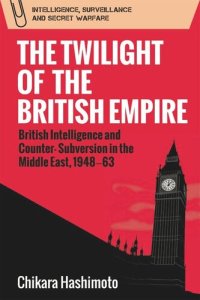
Ebook: The Twilight of the British Empire: British Intelligence and Counter-Subversion in the Middle East, 1948–63
Author: Chikara Hashimoto
- Series: Intelligence Surveillance and Secret Warfare
- Year: 2017
- Publisher: Edinburgh University Press
- Language: English
- pdf
Reveals Britain’s secret counter-subversive policies and security measures implemented in the post-war Middle East
This book reveals, for the first time, a hitherto unexplored dimension of Britain’s engagement with the post-war Middle East: the counter-subversive policies and measures conducted by the British Intelligence and Security Services and he Information Research Department (IRD) of the Foreign Office, Britain’s secret propaganda apparatus. Between 1948 and 1963, British policymakers used intelligence as a tool to maintain British influence in Middle Eastern countries such as Egypt, Iraq, Jordan, Lebanon, Turkey and Iran.
Discover how Britain tried to influence regional intelligence and security services and shape their approach to countering communist subversion. However, amidst disagreements over the nature of the threat and levels of brutality used to counter it, intelligence and secret liasons ultimately failed to protect Britain’s waning influence.
Key Features
- Reveals that Britain was instrumental in creating and training Middle Eastern security services, which often engaged in human rights abuses, and examines Britain’s complicity in these aspects
- Sheds new light on MI5’s activities overseas; MI5’s roles and activities were not only confined to the British Empire, but also areas outside the colonial territories in the Middle East
- Offers an insight into intelligence liaison based on different political systems – the relationship between democratic (British Intelligence and Security Services) and non-democratic governments (their Middle Eastern counterparts) – and also another aspect of intelligence liaison as the means of influencing the policy of a foreign government
- Based on the thesis that won the BRISMES Leigh Douglas Memorial Prize for the Best PhD Dissertation on a Middle Eastern topic for 2014